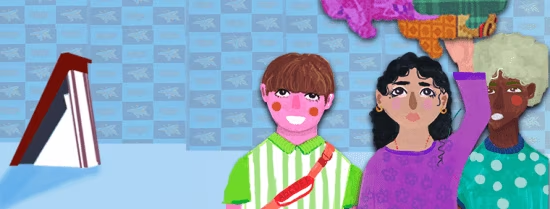📖 Course: Honours programme Tackling inequalities →Back to the Collection
✉️ Contact student: Hanna Griffiths Mumbru, Carlota Guardado, Jeltje van der Haer, Claudia Heese, Thomas de Jong, Savitha Pangad, Giovanni Parente, Jake Tyne, Ekin Su Yilmaz.
Master students from the Honours programme Tackling inequalities worked in a multidisciplinary team for six months. During that period, a group of nine students focused their research and interventions on: How can/does rapid digitalization (re)produce Rotterdam's inequalities in terms of access to local government? After reflecting on the motivation and barriers related to digital literacy in Rotterdam and co-creating with various stakeholders, the group designed an intervention to bridge the gap between generations, help overcome loneliness and the feeling of being isolated and unsafe in the digital world.
OUR PROJECT
It is with a slightly ironic undertone that we would like to present our project. During the spring semester of 2021 we participated in the Master Honours Program ‘Tackling Inequalities’. In a group of nine students, we researched digital inequalities in Rotterdam, with a focus on the digital urban government. Apart from the academic literature and several master classes, we learned a lot from our discussions with several stakeholders. As this period was in the middle of the covid-19 pandemic, these discussions with stakeholders were all online. And this is where the irony is best shown, having conversations with stakeholders about digital inequalities, in an online setting. Nonetheless, we were able to gather valuable insights from our stakeholders that made it possible for us to proceed from an urgency towards a proposed intervention.
FINDINGS
In our research we have found that there is an abundance of programs, courses and initiatives to overcome digital illiteracy, but that the problem of digital inequalities is still prevailing. This could be caused by people being unwilling to digitalize. Or, it is because people do not know where to go to find these services. In our discussions with stakeholders, it became apparent that people were hesitant to use digital services, because they did not feel safe in the digital environment. Furthermore, people find the available courses daunting. They prefer more accessible and low-threshold services, and human contact. Showing people how to perform several tasks online on their own device works a lot better than helping them in course setting with a different device. Also, teaching people how to use a service online that will benefit them is much more effective than teaching them something generic. For example, when you teach someone how to sell a product on Marktplaats, they learn how to do several digital tasks, like uploading a picture, creating an email address and making an advertisement. At the same time, learning this skill benefits them because they can sell their products.

OUR INTERVENTION
Having established that the problem is not in the amount of available initiatives to overcome digital illiteracy, but in the lack of awareness about them, we decided that we should focus our intervention on creating awareness. From our conversations with stakeholders, we decided to focus our attention on the 55+ cohort. We aimed to create awareness by initiating a communications campaign called ‘DigiLife 010’ in which we aim to empower people in helping others to overcome digital illiteracy. It is important to be careful in this regard because it is not our goal to persuade people to digitalize.
The campaign consists of setting up an Instagram page (username: DigiLife010) to empower younger generations to empower family, friends or acquaintances in the 55+ cohort and a complimentary poster campaign to increase awareness of the initiatives and services that the library offers concerning digital skills. Instagram has shown itself to be a powerful space for engaging with people and disseminating information. The Instagram page will, among other things, provide the digitally literate generation with tips and tricks on how to help others without getting into conflicts. Especially, as it aims to provide the digital literate with teaching tools that will empower them to make the digital illiterate to independent users of the digital world. This will also minimize conflict that arises from a dependency on the digitally literate generation. It is therefore very suitable for our intervention, as we want to reach the digitally literate generation to empower them to educate their acquaintances that have fewer digital skills. The poster campaign is a valuable addition to our intervention as it also directly reaches people that are not online. The campaign aims to increase the interest and awareness about the services provided by the local libraries related to courses or initiatives on digital skills.
OUR REPORT
The end product of our research is a written report that describes our progress during the project. It is focused on the development of our urgency, our co-creation, discussions and learning experiences with stakeholders and on the many iterative moments we had during the project. It also elaborates on our urgency and on the possible impact that our urgency can have in the future. Please find our report below.
